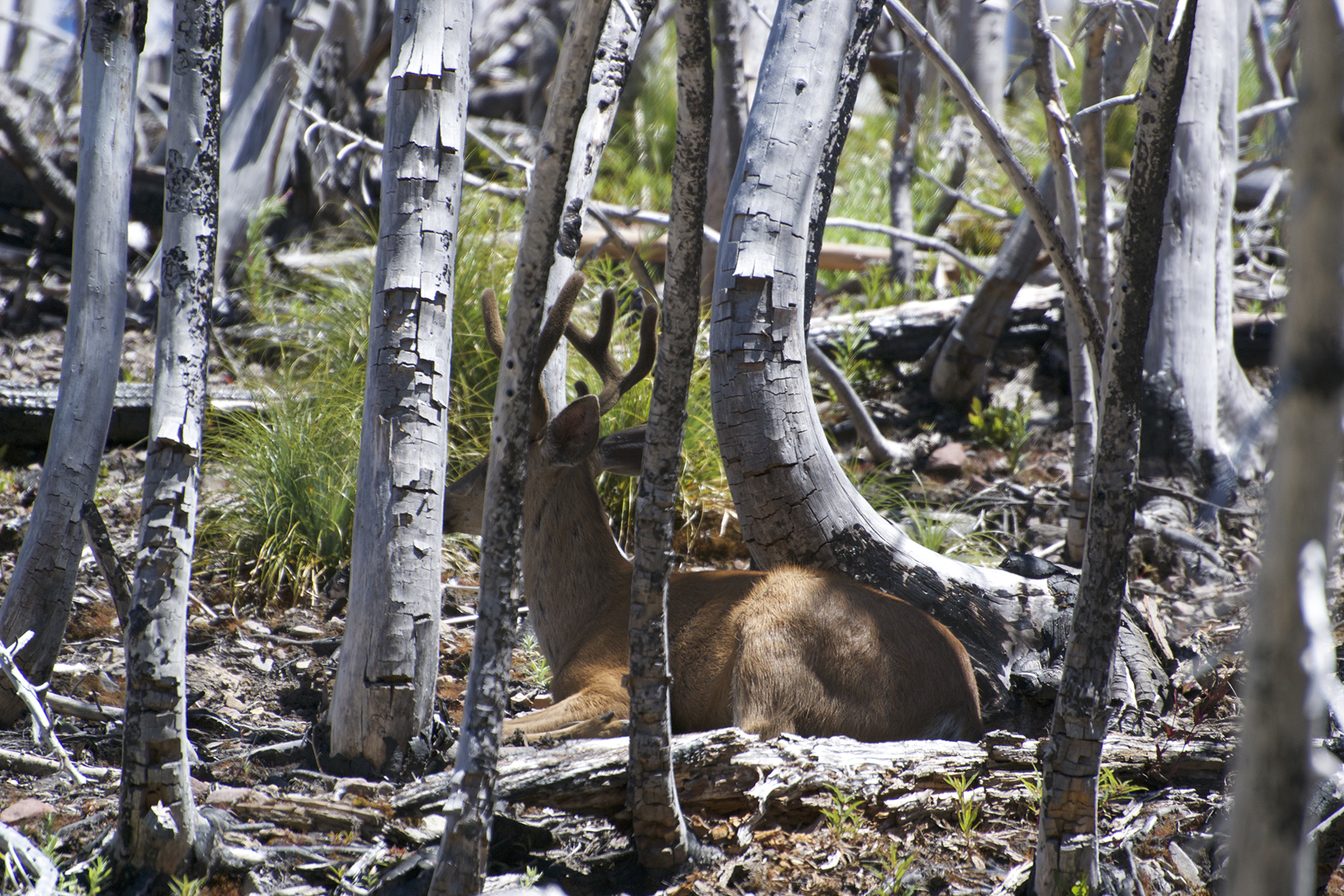One of my favorite outbursts in my ongoing battle with the deer in my garden is: “Have you no shame?” Preferably yelling it loudly, as much as my grumpy lungs allow, or my consideration for my lovely neighbors who don’t need more of my screeching. Not that the deer react – they go on munching on my rose buds, my pink wild-geranium flowers, my columbines, their business – you name it.

Even in the wild, well, in the wilds of Tualatin, where they should be less accustomed to human/deer interaction they do not budge. Photographs from Monday’s walk are evidence that I could approach them to up to 2 meters with my small point&shoot camera. Then again, I did not yell, because I was happy to see them anywhere but in my stripped-down flowerbeds.

Much to know about deer, including the fact, among others, proclaimed by a science site: “The Chinese water deer is the only species that doesn’t shed its antlers, because it doesn’t have any.” Glad that could be added to the canon of irrelevant but funny bits in my brain.

Levantine Cave Painting Art, dated from the end of the Mesolithic Age and during the Neolithic Age at Valltorta-Gassulla Cultural Park in Spain near Valencia.

*
I’m actually more interested in talking about shame rather than deer today, since the absence of the former, whether among those cloven-hoofed ungulates or certain members of the political sphere, has significant consequences for our well-being. Thoughts about shame were triggered by a book review of a book by Ute Frevert, managing director of the Max Planck Institute for Human Development in Berlin, and director of its Center for the History of Emotions.

Lucas Cranach the Elder (1472-1553), Adam and Eve, (1526)

The Politics of Humiliation: A Modern History, now translated from the German by Adam Bresnahan, concerns the relationship between power and shame, shaming, or humiliation. Three areas of interest are used to explain the psychological mechanisms: shaming as punishment for individual transgression in the political, public sphere, humiliation online and in school, and foreign policy between countries. I look forward to reading about the history of how shaming developed across the centuries. “It is the story of the democratisation of the right to dignity and honor, which at different times were regarded as belonging only to the aristocracy and not to commoners, to adults and not to children, to men more than women, to a sovereign and not to a people. ” It is certainly interesting to think that not only the display rules of emotions differ between cultures, or genders, but that there were differences, across time, in who had a right to a particular feeling, or the power to induce it.


The ever looming memory of Nazi public shaming of women married to Jews, (or Norwegian public shaming of women in love with German soldiers) also raises questions about gendered approaches to shame: women often had their hair cut forcibly and in public, humiliation always directed at their bodies, in war (ancient and recent) often through the ultimate humiliation of rape.

Frida Kahlo The Wounded Deer (1946)

As a cognitive psychologist I am of course most interested in how an emotion can be utilized to enact power or manipulate people, mechanisms spelled out in a 2018 interview with the author here. The distinction between shaming and humiliation is important. Shaming was always used as punishment for a norm-defying person to get them to repent and then back into the fold. Humiliation, on the other hand, has the goal to stigmatize the person and set them apart from the group. The state or political actors historically used these mechanisms, but nowadays on-line platforms have joined in, with body/fat-shaming just one example (which reminds me: I did NOT find Speaker Pelosi’s fat shaming of a certain monster appropriate, in fact it irritated me to no end. You can’t join the gutter.)

Here is the contradictory part: on the one hand we, as a society, value honor and respect (and rightfully decry its absence), but on the other hand we show increasing appetite for public humiliation, just look at all those reality shows. The psychological mechanisms seem to point to a gain in self esteem or sense of group membership when we berate and belittle others, openly and in front of everyone. If we are part of the group that is humiliating rather than humiliated, it gives us a sense of security and belonging, as well as power. And if we create specific out-groups through acts of humiliation we can utilize their status for our political purposes, directing and displacing anger at those victims. (Although seemingly, if we are paid enough, we are also willingly complying with a potential state of humiliation – just look at the lines of the casting show. Honor has a price, after all, as Frevert puts it.)


I think, well, I hope that knowing about the mechanisms of how humiliation works enables us to inoculate ourselves against related attempts to employ it as a tool, attempts surely to increase in the context of the election campaign. If humiliation thrives on having a public participate, it is up to us, the public, to refuse to be participants in the spectacle. We can turn away.
Now all I wish is for the deer to do the same.
Today you have a choice between Mozart’s The Hunt and Haydn’s (The Hunt) and Cesar Franck’s Accursed Hunter – maybe the latter felt some shame….

.






Deb Meyer
You have an awesome ability to find the right moment to take a picture! I have never seen a deer pee before! She has no shame except afterwards she went on eating your delicious roses!